Addenbrooke's Hospital in Cambridge prepares for busiest winter ever
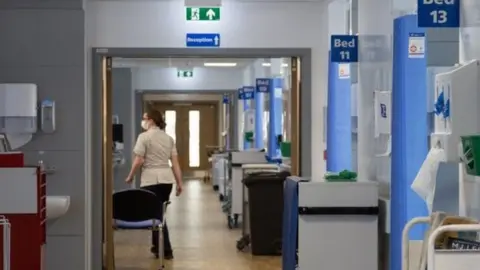 CUH
CUHThe Covid pandemic has forced many hospitals to cancel operations and allowed waiting lists to grow. With infections still on the rise and winter looming, how is one of England's flagship hospitals making up for lost time?
Addenbrooke's Hospital in Cambridge is gearing up for what it expects to be its busiest winter ever.
The hospital, which performs many specialist operations other hospitals are unable to, has a waiting list of 47,800 patients, 40% higher than pre-pandemic levels.
Of those, 3,900 have been waiting more than a year. Such long waits had been banned, but due to the pandemic, the NHS has stopped fining trusts that exceed this.
Some are waiting longer still. The number of patients waiting over 98 weeks has risen to 172, up from 112 the previous month.
Addenbrooke's hopes to cut its waiting lists by conducting 500 operations a week, even more than before the pandemic, despite having a full emergency department and fewer beds due to infection control measures.
Staff have been working longer days and weekends in order to tackle the backlog, but their task is made even harder by the fact that as some people are waiting longer, they become more sick, so are spending more time in hospital.
Releasing patients can also be difficult because of a lack of social care staff or mental health beds.
Help is around the corner, however: a new 56-bed unit is due to open early next year, part of an ongoing programme to provide five extra wards and 116 beds.

'They have put me first as a patient'
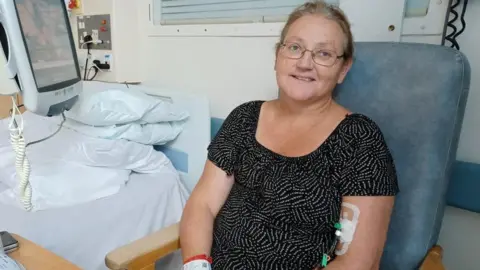
Vicky Watts, 50, from Southminster, Essex has stage four breast cancer.
During the pandemic, she received cancer treatment and an operation to replace a hip, but had been told she would have to wait at least two years to have the other replaced.
However, Addenbrooke's managed to bring the operation forward by a year, carrying out surgery on Friday.
"The pain can really get you down but the hospital has been absolutely amazing. They have put me first as a patient," she says.
"Being able to spend time with your family after not being able to in the pandemic is massive - huge.
"What bothers me is having a life and enjoying what time I've got left and making the most of it, not in pain."

'Any wait is painful to watch'
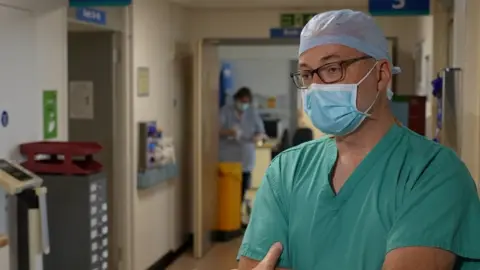
James Wheeler, divisional director of surgery and theatres, says staff are tired but that the hospital has made "significant progress" in surgery.
"We managed to maintain a lot of cancer services during the course of the last 18 months," he says.
"However, there are undoubtedly a lot of patients with non-cancer diagnoses, or less urgent diagnoses, all of which are incredibly important, that are going to take us some time to be able to treat and operate upon."
Despite this, Mr Wheeler acknowledges some people are waiting longer for their treatment.
"Any wait is painful to watch. All I can really reassure is that we are doing everything in our powers to get through the backlog patients," he says.
The hospital is fortunate in being able to ring-fence beds in order to keep "elective surgical patients safe", he says.
However, he acknowledges that balancing planned surgery and emergency cases will be challenging for the hospital as its moves into its busiest time.

'If we play together, we can get through this'
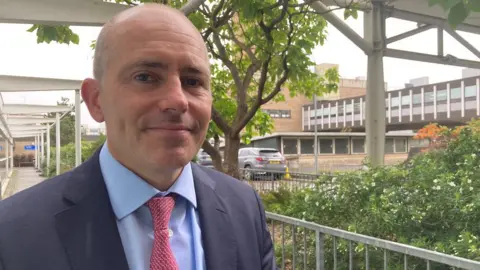
At times, Addenbrooke's accident and emergency department has been so busy some patients have had to wait outside.
Roland Sinker, chief executive of Cambridge University Hospitals NHS Foundation Trust, which runs the hospital, says he is "desperately sorry" that people are having to wait at all.
"The challenges we are facing are more people needing care, and also the fact that we've had to lose more than 70 of our 1,200 beds [due to infection control]."
Mr Sinker says he is "very concerned" about the coming few months.
"If we can get the hospital teams, the population and partners outside the hospital playing together in a way that we did during Covid, I think we can get through this six-, nine-month period," he says.
The hospital is asking people to "use the right service, at the right time" so it can continue providing care for those who most need it.

'The boosters will save lives'
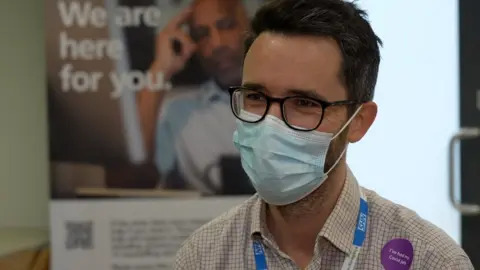
Addenbrooke's is also undertaking a programme to vaccinate staff against flu and Covid to keep them both safe and in work.
Dr Joseph Newman, a respiratory registrar with Cambridge University Hospitals, says it is "incredibly important" for its workforce of more than 11,000 to be vaccinated.
"Staff shortages this time last year were a real issue, adding to the pressure even more, so I think trying to keep everyone fit and healthy is really important," he says.
"The boosters will save lives and continue to take pressure off the NHS. It's a really important time."

Find BBC News: East of England on Facebook, Instagram and Twitter. If you have a story suggestion email [email protected]
